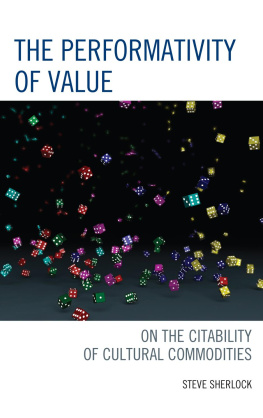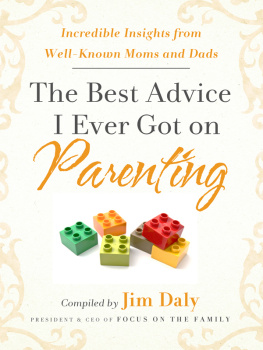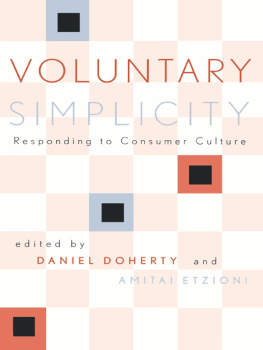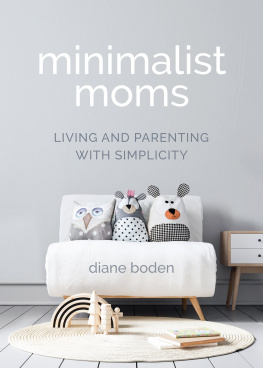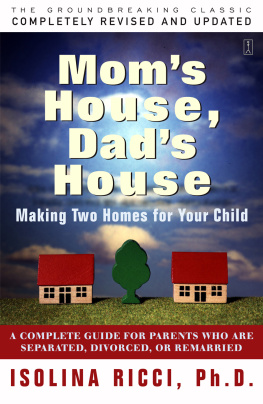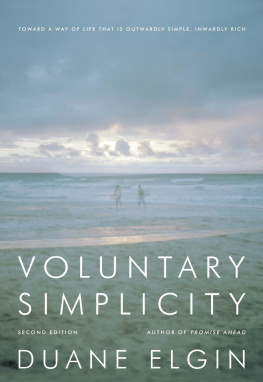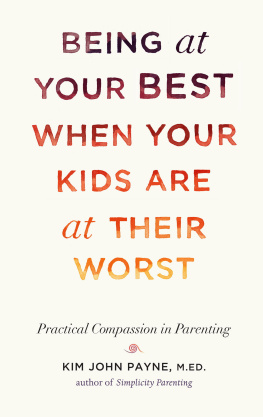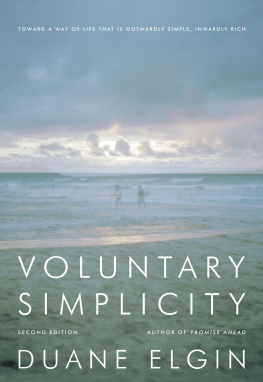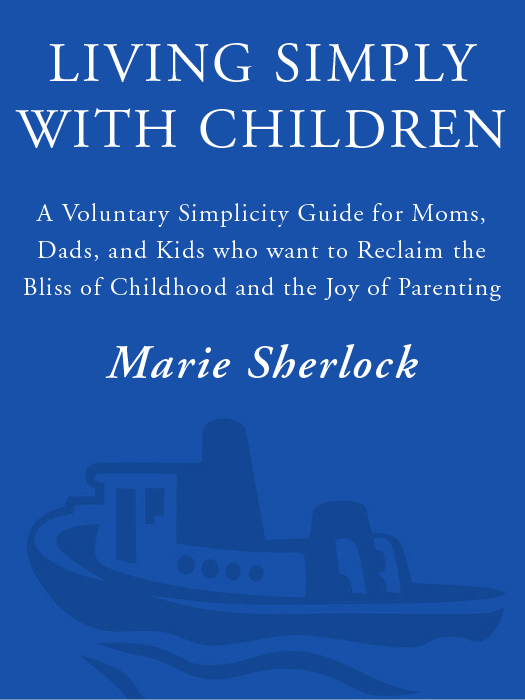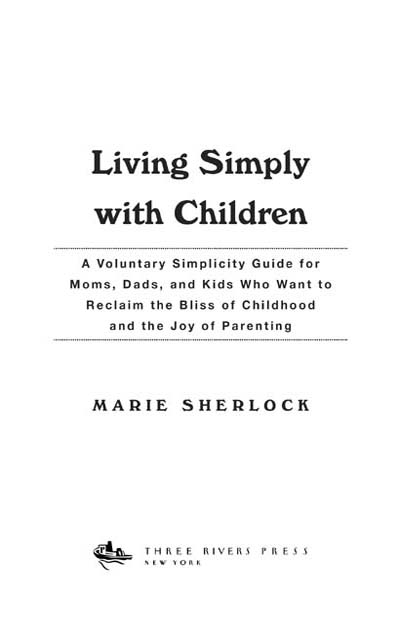Praise for
Living Simply with Children
Its so hard to know how to be a good parent these days. Should you pressure your kids to achieve? How do you deal with advertising? What do you do about teen fashions? Marie Sherlocks book is incredibly well written, relevant, and helpful. Its a book you should keep handy to consult whenever you feel overwhelmed or frantic. Better yet, get together with some other parents and talk about it together.
C ECILE A NDREWS , author of
The Circle of Simplicity: Return to the Good Life
Excellent! Exactly what families with children need to know right now! Sherlock soundly debunks the notion that living simply with children cant be done in todays world. To the contrary, she clearly shows how simple living makes family life richer, instills important values in our kids, and is better for the earth. Living Simply with Children is a must read for all parents and for anyone wanting to lead a more meaningful and sane life.
J ACQUELINE B LIX AND D AVID H EITMILLER ,
authors of Getting a Life: Strategies for Simple Living
Based on the Revolutionary Program for Financial
Freedom, Your Money or Your Life
In Living Simply with Children, Marie Sherlock writes with wisdom and clarity regarding a crucial subject for all who care about Americas children and therefore its future. As an early childhood educator, I believe that the importance of her message to our childrens creativity, self-esteem, and well-being cannot be overemphasized. As a parent, I only wish that I had read this book twenty years ago to maximize my own childrens chances for joyous, fulfilling lives.
C AROL H OLST , founder/director, Seeds of Simplicity
To the simple living family I grew up with:
My parents, Gerald and Blanche Sherlock,
and my siblings, Pat, Tim, Dan, and Shelley.
To the simple living family I helped create:
My husband and kids, Marty, Ben, and Scott.
And to all simple living families everywhere.
Acknowledgments
My deepest thanks:
To Marty, Ben, and Scott, for their love, patience, and support.
To David Heitmiller and Jacque Blix, who believed in this project from the start and came to my rescue countless times along the way.
To Beth Vesel, my agent, who found a publisher at mind-bending speed.
To my editor at Three Rivers Press, Becky Cabaza, who, with kindness and wisdom, helped me to make this book much better.
To Carol Holst, Linda Breen Pierce, Cecile Andrews, Janet Luhrs, Vicki Robin, Betsy Taylor, Michael Fogler, Gerald Iversen, and other members of the simplicity movement, who contributed their time, ideas, and encouragement.
To Greta Simonson, my wise and wonderful friend, and all of my other friends and relatives who, with sincere interest, kept asking Hows the book going? month after month after month.
To Eric Brown and the Center for a New American Dream, for their indispensable assistance in helping me to find parents attempting to raise their kids simply.
And to the dozens of simple living families who shared their stories and insights on living simply with children. I couldnt have written this book without you.
Contents

Part 1
The WhysWhy Your Family
Should Practice Simplicity
Part 2
The HowsHow You Can
Live Simply with Children
Foreword
It takes a corporation to raise a child.
Say what? Isnt that It takes a village?
Well, look at the reality. Advertising jingles have replaced camp songs. Brands have replaced clans as a source of identity. Bonded day care has replaced the stay-at-home mom. Corporations are writing textbooks, funding television programming, setting style trends. In Monty Pythons The Meaning of Life, an expectant mother, surrounded by a delivery room full of machines, is dismissed from participation in the birthing process by a patronizing doctor. Youre not qualified, he snaps.
Indeed, parents no longer feel qualified to parent. Our hurry-up, competitive, crowded, and commercialized world means you cant just send the kids into the backyard to play or down the street to Grandma or off to public school with the rest of the kids in town. Those days are gone for most of us. Parenting is privatized and professionalized. Parenting skills arent just knowing when to hug and when to scold. They now consist of a welter of choices involving much insecurity and research. Which diapers? Which preschool? Will they suffer if I dont get them the sneakers? Will they suffer if I do? Do I limit TV? Or throw it out the window? Or just be grateful the kids have some stimulation while I frantically manage the other thousand things on my list? Do I give them an allowance or make them work for it? Do I send them to private school for the academics or to public school for the socialization? Do I give them college or make them work for it?
Back when there were villages that raised us, there was no such thing as a single parent, or even an isolated nuclear family. Parenting came naturally to most because we learned it from all the adults who were parenting all the time. Ample free time and luxurious hours of socializing and ceremony quickly brought collective attention to any individual problem. This way of life persisted for tens of thousands of years. Indeed, ancient languages probably never made the social roleparentinto a verb.
The consumer culture, barely a century old, has changed all that. The first empowerment for parents now is just realizing that the consumer culture itself is an aberration. This is why it now takes determined, conscious, intentional, heroic simple living parents to raise a healthy child. It takes instructions such as you will find in great measure in Marie Sherlocks wonderful book, which you are lucky to have in your hands. So as you struggle with parenting, know that you are pushing against a massive surrogate parentcommercialismthat is trying to take your kids and raise them to be consumers.
Andy Lipkis, visionary founder of TreePeople in Southern California, once told me that if there were just a three-day ban on cars in Los Angeles the smog would completely clear. Smog doesnt happen. People happen it each morning when they crank their cars and join the rivers of polluting vehicles on L.A.s network of freeways.
Would our minds similarly clear if we didnt crank over the 3,000 advertisements a day that keep the pall of consumer culture hanging over our heads? If we were to take the logos off clothing, make everything from panel vans to television to schools (especially schools) commercial-free zones, then how would it be to raise children in America? If we were to quiet the incessant pressure to buy, would we still see ourselves as greedy animals whose basic drive is to have more? I think we would so naturally live a simpler life that it would need no instruction or defense.
We would know that who we are is more important than what we own. Wed know that toys rnt us. And so would our children. We would have more parks and fewer malls. More libraries and fewer unread books in private collections. More teachers earning more money to guide our most precious resourceour youthand fewer soldiers to protect our national possession obsession.


